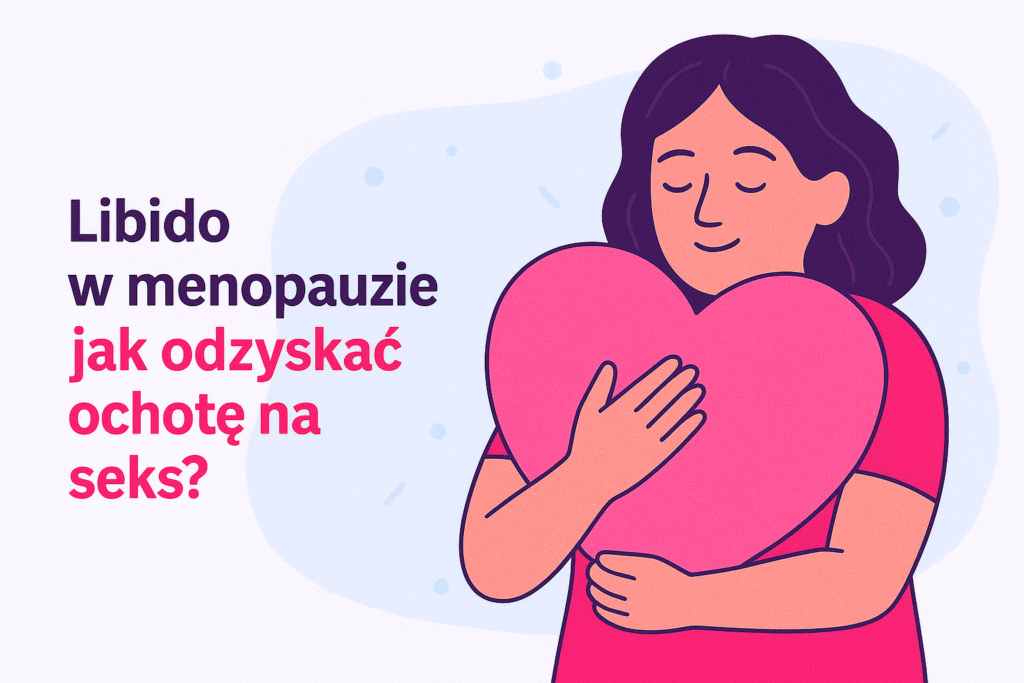Libido During Menopause – How to Regain Sexual Desire?
Menopause is a time of change not only in the body but also in the mind and relationships. Decreased libido is one of the most commonly reported issues by women over the age of 45. It is often accompanied by vaginal dryness, reduced self-confidence, fatigue, and low mood. Although decreased sexual interest is physiological, it does not have to mean giving up on intimate life. There are effective ways to rebuild it – both natural and medical.
Why does libido decrease during menopause?
The main cause is the drop in estrogen and androgen levels (especially testosterone), which regulate sexual desire, tissue lubrication, and blood flow to the genitals¹.
The most common physiological and psychological causes of low libido include:
- Vaginal dryness and pain during intercourse (dyspareunia)
- Sleep disturbances, fatigue, chronic stress
- Mood swings, depression, anxiety
- Negative body image, loss of self-confidence
- Relationship problems or lack of emotional support
Some women also report reduced pleasure or difficulty reaching orgasm, which discourages intimacy².
How to restore libido during menopause?
1. Treating vaginal dryness and painful intercourse
Vaginal dryness affects up to 50% of postmenopausal women and often goes untreated³. It can significantly impact sexual comfort.
Effective solutions include:
- Water- or silicone-based lubricants – provide immediate relief and improve comfort
- Vaginal moisturizers (e.g., with hyaluronic acid) – offer long-term hydration
- Local estrogens (suppositories, creams, vaginal rings) – rebuild the mucosa and restore elasticity⁴
2. Hormone therapy (HRT or androgen therapy)
In women with significantly reduced libido, especially those after surgical menopause, hormone therapy may be considered.
- HRT (estrogens + progestogen) – improves lubrication, genital blood flow, and overall well-being
- Low-dose testosterone – may increase libido in women with deficiency, but requires individualized assessment⁵
3. Psychosexual and emotional support
- Individual or couples therapy – helpful in addressing tensions, trauma, or communication issues
- Cognitive behavioral therapy (CBT) – effective for negative body image and low self-esteem
- Mindfulness exercises and meditation – enhance body awareness and present-moment focus
4. Strengthening connection and communication in a relationship
Being open about needs and bodily changes can bring partners closer. Exploring new forms of intimacy together – massage, touch, pressure-free time – can restore a sense of closeness and safety⁶.
5. Physical activity and a healthy lifestyle
- Exercise improves circulation, oxygenates the brain, and boosts endorphin levels
- Regular workouts have a positive effect on body image and self-esteem⁷
- Yoga and Pilates enhance flexibility, body awareness, and pelvic floor muscle tone
6. Natural libido boosters
Some herbs and supplements may support hormonal balance and enhance libido:
- Maca (Lepidium meyenii) – a root used in Peruvian medicine, may increase sexual desire⁸
- Korean ginseng – acts as an adaptogen and supports libido
- DHEA (dehydroepiandrosterone) – a precursor hormone, available as a supplement in some countries; moderate effectiveness
- L-arginine – an amino acid that improves genital blood flow
Before using supplements, it’s best to consult a doctor, especially if you have chronic conditions.
When to see a specialist?
It is worth consulting a gynecologist, sexologist, or psychotherapist if:
- Loss of libido persists for months and affects your relationship
- There is pain during intercourse
- Lack of interest in sex is linked to depression or anxiety
- There are problems with body image
Summary
A decrease in libido during menopause is common, but it doesn’t have to signal the end of sexual life. On the contrary – many women over 50 discover a new quality of intimacy once they acknowledge their needs and begin supporting their bodies and emotions. Nurturing intimacy, relationships, and hormonal health is an investment in feminine wholeness in this new life stage.
Przypisy
- Davis SR et al. Managing menopause: biologic basis and evidence-based options. J Clin Endocrinol Metab. 2015.
- Dennerstein L et al. Sexuality and the menopause. J Psychosom Obstet Gynaecol. 2003.
- Nappi RE, Palacios S. Impact of vulvovaginal atrophy on sexual health. Climacteric. 2014.
- Bachmann G et al. Vaginal estrogen therapy for the treatment of atrophic vaginitis. Menopause. 2009.
- Wierman ME et al. Androgen therapy in women: a reappraisal. J Clin Endocrinol Metab. 2010.
- Brotto LA, Luria M. Sexual interest and desire in women. Can J Psychiatry. 2014.
- Ambler DR et al. Physical activity and sexuality in midlife women. J Womens Health. 2006.
- Gonzales GF et al. Effect of Lepidium meyenii (maca) on sexual desire in men and women. CNS Neurosci Ther. 2012.

